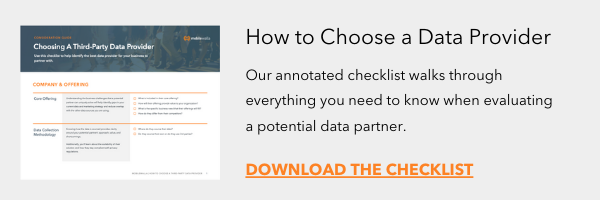Data enrichment is increasingly seen as a business necessity. According to Gartner, 35% of large organizations will either buy or sell data via formal marketplaces by 2022, up from 25% in 2020.1 And in the post-COVID landscape, McKinsey & Co. predicts that heavily impacted industries such as retail, financial services, and telecommunications companies will increasingly justify the expense of third-party data purchases for machine learning data enrichment.2

Whether your organization is considering third-party data enrichment for the first time, or if you’re wondering how the events of 2020 have impacted the landscape, here are three key data trends and market changes that affect how organizations evaluate data enrichment services providers moving forward.
1) CCPA & Other Expanding Privacy Regulations
Digital privacy was a headlining public concern in 2020, due in part to burgeoning consumer privacy laws taking shape worldwide to catch up with the quick pace of digital business. The California Consumer Privacy Act (CCPA) is a prime example that went into effect earlier this year, following in the steps of Europe’s General Data Protection (GDPR) act. Since consumer privacy laws show no signs of slowing down, many are wondering how to keep privacy mandates from impacting marketing strategies.
Impacts on data enrichment:
- Compliance with privacy mandates requires sourcing data from compliant repositories. Ask potential data providers about GDPR, CCPA, opt-out requests, and any other regulations affecting your business.
- Data protection legislation will likely expand and mature in the coming years, so brands participating in data exchanges should understand the potential for long-term privacy obligations.
- Ensure you are working with a vendor who takes privacy seriously, diligently screens their partners for compliance, has incorporated a rigorous internal privacy framework, and is working with national and international industry groups such as the IAB to understand ongoing privacy issues and trends.
2) Phasing Out Third-Party Cookies
Apple Safari, Mozilla Firefox, and Google Chrome – which collectively represent about 86% of worldwide browser share – have either blocked or announced plans to phase out support for third-party cookies.3 For years, many marketers and data companies have relied on these cookies to track visitors and browsing habits in order to improve web experiences and optimize ad campaigns, and now this data source will be cut off (the Chrome phase out will take place in stages to be completed by 2022).
Although this phase-out will cause interruptions, other data enrichment and identity resolution techniques can fill in the blanks left by third-party cookie data.4 Brands are still free to collect data via first-party cookies, and many partners can fill in the gaps with reputable third-party data that has been sourced through other means.
Impacts on data enrichment
- To avoid disruptions, consider avoiding data providers that rely heavily on third-party cookies, as this data will be significantly limited in the near future.
Related Reading: How Data Enrichment Improves Predictive Modeling
3) Restricted Access to Mobile Advertiser IDs
Just as third-party cookies have been a source for web browsing data, mobile advertising IDs (MAIDs) have been a source of location and browsing data for app developers and mobile advertisers alike. In June, Apple announced plans to let users block access to ad tracking IDs (referred to in iOS as IDAF, for “identifier for advertisers”) along with other efforts intended to promote privacy.
While blocking access to mobile ad IDs could significantly disrupt the digital advertising ecosystem, the full impact of Apple’s announcement remains to be seen. Mobilewalla’s early internal analysis of iOS 14 mobile signals is consistent with a very modest opt-out rate.
Apple pushed back its original plan to block mobile ID access by default until 2021, citing a need to give developers more time to adapt. Android users have been able to turn off ad ID access for years, but the digital ad space has thrived despite this option.
Impacts on data enrichment
- Mobile ad tracking could be one of the biggest areas of data ecosystem changes in 2021; developers and advertisers are working to respond and new developments are expected throughout early 2021.
- Third-party data partners with a highly diverse data set will be better positioned to buffer and absorb the impact of these changes.
- Data partners should be able to key and access data off of multiple keys, including but not limited to the MAID.
To explore the third-party data landscape further, connect with us. Contact Mobilewalla to ask questions, learn about new developments, or find the best data solutions to enhance your consumer intelligence and optimize predictive models.
Resources:
[1] https://www.gartner.com/smarterwithgartner/gartner-top-10-trends-in-data-and-analytics-for-2020/
[2] https://www.mckinsey.com/business-functions/mckinsey-analytics/our-insights/leaderships-role-in-fixing-the-analytics-models-that-covid-19-broke
[3] https://gs.statcounter.com/browser-market-share#monthly-202009-202009-bar
[4] https://blog.hubspot.com/marketing/third-party-cookie-phase-out

Mobilewalla
Start making more informed business decisions and effectively acquire, understand, and retain your most valuable customers. Get in touch with a data expert today



